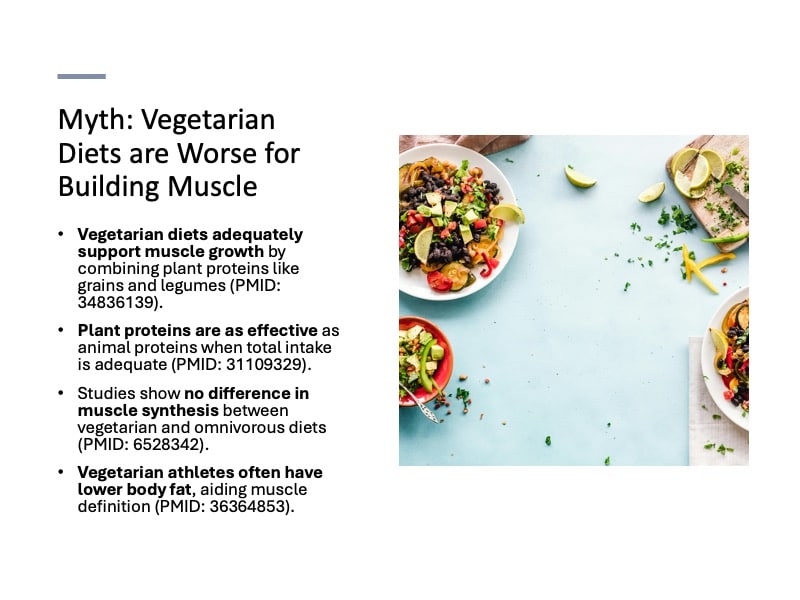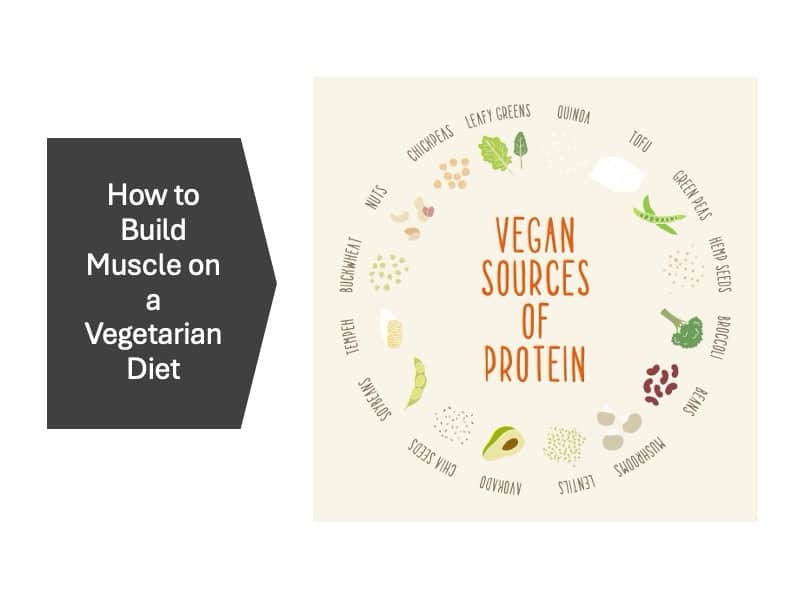How to Build Muscle on a Vegetarian Diet: A 4 Step Process
Contrary to common belief, it is entirely possible to build muscle on a vegetarian or vegan diet. In fact, plant-based diets have gained significant popularity in recent years among athletes.
A 2021 study published in Nutrients revealed that with proper dietary planning, vegetarian and vegan diets can support muscle protein synthesis, strength gains, and athletic performance at levels comparable to omnivorous diets (Pohl et al., 2021).
Vegetarian athletes can thrive by combining plant-based proteins to meet essential amino acid needs and fueling their bodies with nutrient-dense, whole foods.
I have seen firsthand that plant-based athletes can excel at the highest levels. For example, Ike Nwamu, a professional basketball player for the Nigerian National Team and a friend, maintained a vegan diet for years when I played alongside him in Łańcut, Poland.
Despite his plant-based lifestyle, Ike displayed an incredibly muscular physique and explosive athleticism.
This example, and many others, show that genetics, disciplined training, and a well-planned diet can help any athlete build muscle, regardless of their dietary preferences.
Step 1: Maximize Your Muscle-Building Genetics
While diet is critical, genetics play a significant role in determining muscle-building potential. Some people are genetically predisposed to develop muscle more easily, while others may have to work harder to achieve the same results.
However, a plant-based diet will not limit your potential if you consistently train and meet your nutritional needs.
Ike Nwamu, for instance, was naturally gifted with strong genetics, but his dedication to his training and vegan diet allowed him to maximize his genetic potential and build one of the most athletic physiques I’ve ever seen.
Yup, this guy is a vegan:
Genetics certainly contribute, but proper nutrition is a key factor in achieving muscularity, no matter your dietary choices.
Step 2: Prioritize Protein Intake with Plant-Based Sources
A key to muscle building on a vegetarian or vegan diet is ensuring the intake of complete proteins—those containing all nine essential amino acids.
While animal-based proteins naturally provide all essential amino acids, vegetarian or vegan protein sources can also meet these needs when appropriately combined.
- For example, pairing grains like rice with legumes such as beans or lentils creates a complete protein profile.
- Combining these foods at each meal ensures your body receives the necessary amino acids to support muscle repair and growth.
The idea that plant-based proteins are inferior to animal proteins is a myth.
Research has consistently demonstrated that plant proteins can be just as effective for muscle growth when consumed in adequate amounts (Teixeira et al., 2022).
Vegetarians and vegans need to be mindful of their total protein intake, but when amino acid sources are diversified, muscle gains are achievable.
How Much Protein Do You Need to Build Muscle
A common question is, how much protein do you need to build muscle?
While needs vary, a good target for most athletes is around 1.6-2.2 grams of protein per kilogram of body weight each day.
By diversifying protein sources and choosing the best foods for building muscle—like tofu, lentils, and quinoa—vegetarian athletes can meet their protein needs for muscle growth.
For those looking to ensure they hit their daily protein goals, vegan protein powders can be incredibly helpful.
My favorite is Garden of Life Protein and Greens, which provides a complete amino acid profile and includes nutrient-dense greens for additional health benefits.
Additionally, RSP Amino Lean, with its vegan EAA complex, is an excellent supplement to support muscle growth and better body composition.
But when it comes to an all-around protein supplement, I believe Garden of Life Raw Protein & Greens is the best protein powder supplement due to its clean, plant-based ingredients and balanced nutrition.
If you’re looking for a new vegan protein powder, Garden of Life Raw Protein & Greens is my top choice and the best protein powder available at Walmart because Walmart offers it at a lower price than Amazon, making it a budget-friendly option.
Last update on 2025-07-08 / This article includes affiliate links/Images via Amazon Product Advertising API. I may earn commissions on purchases made through these links.
Myth: Vegetarian Diets are Commonly Protein Deficient
A common misconception is that vegetarians and vegans struggle to consume enough protein to build muscle.
However, research shows that athletes on a well-planned plant-based diet can meet their protein needs just as effectively as those on an omnivorous diet.
For instance, a study comparing whey protein to a novel plant-based protein found no significant differences in body composition, strength gains, or aerobic performance between the two groups.
This further debunks the myth that plant proteins are inferior to animal proteins for muscle growth.
Step 3: Lift Heavy and Consistently for Maximum Muscle Growth
If you want to build muscle on a vegetarian or vegan diet, there’s no getting around the fact that you need to lift heavy and lift consistently. Your plant-based protein sources, whether it’s tofu, lentils, or quinoa, can provide the fuel, but the muscle comes from putting in the work in the gym.
The key to success is simple: challenge your muscles with resistance training and do it regularly.
Whether you’re doing squats, deadlifts, or bench presses, the more you push yourself, the more your muscles will grow.
It doesn’t matter if your protein comes from steak or chickpeas—what matters is that you’re committed to lifting hard and often. So, hit the gym, stay consistent, and let your plant-powered muscles do the talking.
If you are trying to build muscle, checkout the workouts I post in my Workout of the Day category.
It’s a structured, well-rounded plan focusing on strength, endurance, and mobility, making it perfect for those looking to make serious, long-term gains.
Step 4: Leverage the Vegetarian Diet for a Leaner, Stronger Physique
One of the hidden advantages of a vegetarian or vegan diet is its ability to support a lean, aesthetic physique. Vegetarian diets are typically higher in fiber and lower in calories, which aids in fat loss and helps athletes maintain a lean body composition.
A high fiber intake also promotes better digestion and gut health, which can enhance nutrient absorption and boost overall metabolic efficiency.
Studies have shown that plant-based athletes tend to have lower body fat percentages compared to their omnivorous counterparts, leading to a more defined, muscular appearance (Kwiatkowska et al., 2022).
This is particularly beneficial for athletes seeking a leaner, more aesthetic look while maintaining muscle mass.
Additionally, plant-based diets are naturally rich in antioxidants, which can help reduce inflammation and speed up recovery from workouts. This allows athletes to train more intensely and frequently, contributing to greater muscle growth over time.
A well-rounded vegetarian diet, rich in vegetables, fruits, legumes, and whole grains, provides an abundance of nutrients to support both muscle building and fat loss.
Nutrient Concerns for Building Muscle on a Vegetarian Diet
Despite the benefits of a plant-based diet for building muscle, there are a few key nutrients that vegetarian and vegan athletes should monitor closely to optimize their muscle-building efforts.
These include vitamin B12, vitamin D, iron, and omega-3 fatty acids.
Since these nutrients are commonly found in animal products, plant-based athletes may need to supplement or include fortified foods in their diet to prevent deficiencies that could negatively impact performance and recovery.
- Vitamin B12 is crucial for red blood cell production and energy metabolism. Since it is primarily found in animal products, vegetarians and vegans are advised to take a B12 supplement.
- Vitamin D is important for bone health and muscle function, and it can be obtained through sun exposure or fortified plant-based milk and supplements.
- Iron is essential for oxygen transport and energy production during exercise. Plant-based sources of iron, such as lentils, spinach, and quinoa, should be consumed with vitamin C-rich foods to enhance absorption.
- Omega-3 fatty acids, commonly found in fish, can be sourced from flaxseeds, chia seeds, and algae-based supplements to support muscle recovery and reduce inflammation.
By ensuring an adequate intake of these nutrients, vegetarian and vegan athletes can optimize their muscle-building potential and overall health.
Final Thoughts: Can You Build Muscle on a Vegetarian Diet?

Building muscle on a vegetarian diet is not only possible but can offer unique benefits for body composition, recovery, and long-term health.
By combining complementary plant-based proteins and paying attention to key nutrients like vitamin B12 and iron, vegetarian athletes can fuel their muscle-building efforts and achieve impressive results.
Athletes like my friend Ike Nwamu exemplify the potential of a plant-based lifestyle for muscle growth and athletic performance, proving that a vegetarian diet can support even the most muscular physiques.
Last update on 2025-07-08 / This article includes affiliate links/Images via Amazon Product Advertising API. I may earn commissions on purchases made through these links.
This website does not provide medical advice. This website site does contain affiliate links, and purchases may earn a commission.
Read my Medical Disclaimer, Review Disclaimer, and Publishing Policies for more details. Use of this site indicates acceptance of these terms.




